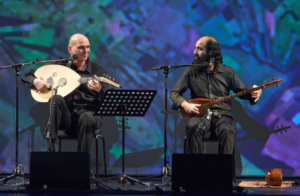While most Westerners are at least tangentially familiar with classical music, few are likely to have even heard of ancient Greek music, and this is precisely what Early Music Vancouver (EMV) hopes to rectify through the performance of Treasures from Byzantine Manuscripts, a component of the Pacific Baroque series.
EMV artistic director Suzie LeBlanc says that these pieces of music are highly intricate and complex, and that they were typically learned and disseminated only orally, from generations long past.
“Most of this music was passed down orally, and the manuscripts are kind of the written-down form, and it’s not at all like a notation that we’re used to. According to the leader of [ensemble] En Chordais [who are performing at the concert], Kyriakos Kalaitzidis, for one page of these Byzantine Manuscripts, it takes about 50 to 80 hours to transcribe it into modern notation for modern musicians,” says LeBlanc. “It’s a huge amount of work; this manuscript is enormous—there’s something like 400,000 pieces—and so they’ve been working on it for years, and I think are not finished.”

LeBlanc loves that ancient Greek music is so different it’s incomparable to anything else she’s heard, and she’s utterly charmed by it.
“I don’t know if you’ve ever heard Greek chanting like you do in an orthodox church. This is different; it’s got some similarities,” says LeBlanc. “Every pore of your body, when you’re in the midst of it… When I hear it, my body is transfixed and I can’t think of anything else, I’m just really transported by the fact that you can’t relate it to Western music, so you’re just bathing in something that is not only organic, but that comes from the antiquity.”
LeBlanc points out that well-composed music is like a stunning vista for her ears, enveloping her inside this magical sound.
“I think it’s just as exciting as if you go to the Acropolis,” she says. “Just bathing in this music is like a trip to the past, it’s really exciting, and then you have all the instruments, so they’ve got the chants and the dance music that they really bring to life, it’s really exhilarating, kind of the best of something really deep, poetic, and something very exciting and physical.”
Music is a form of history and art, says LeBlanc, and should be preserved with just as much care and intensity.
“I am a believer in heritage, so as much as a building or a painting has value from the past, I think the music does as well, and we have to take care of it in the same way,” she says. “There are musical geniuses all throughout history, and if the music survives and is still played today, I think it’s because it still pleases, and it still has a message for us. I think it’s really interesting to listen to music before the time of the Industrial Revolution, because I feel like people’s brains were connected in a slightly different way than ours, and I just want to be connected to that.”
LeBlanc says that archaic music is a great way to lose yourself, to transcend time and space for a few short minutes while listening to it.
“Human emotions haven’t changed that much in the last 12 centuries,” she says. “I think it’s really interesting because there’s something intrinsically human that we connect to that’s in music from a long time ago, and that fascinates me, that we still can respond to it, and it is that language, it shouldn’t be lost. But even more wonderful is that it still can really speak to us, because we have emotions, and we’ve always had them, and the music speaks directly to the emotions.”
Treasures from Byzantine Manuscripts
7:30 pm Friday, September 23
$43, Christ Church Cathedral
pacbaroque.com
